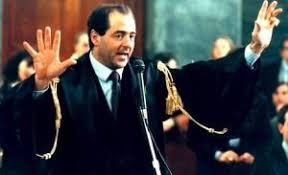Antonio Di Pietro – a household name for a Maltese generation bred on Italian TV before the advent of cable TV – will be the star speaker in a Justice demonstration organised by the Civil Society Network scheduled for 3 December. But for the younger generations Di Pietro’s name might be new.
So who is Antonio Di Pietro?
- He was born in the Italian province of Molise in a family of farmers…he used to take the animals to graze in the afternoons after returning from school.
- Di Pietro served a brief stint in Germany as a migrant factory worker before turning to a career in law enforcement. He worked his way through night school as a police officer, earning a degree in jurisprudence. In the mid-1980s he became a magistrate, a position which in Italy combines the functions of detective and prosecutor.
- He earned the nickname Tonino il Telematico for availing himself of modern computer technology to prepare data which he used to present in court.
- In 1992, Socialist Party official Mario Chiesa was arrested for taking a €3,500 bribe over a services contract for the Milan hospice he ran – it marked the start of “Mani Pulite,” or “Clean Hands,” a far – reaching probe into the murky side of Italian business and politics.
“I personally marked every note, one by one. It was the only way we could be absolutely certain of proving that a bribe had been paid,” Di Pietro recalled. “When he turned round to me and said, ‘But it is my own money,’ I was able to reply, ‘well, explain how they came to have my mark on every single bill.'” - Together with other magistrates of the Milan pool he exposed a system of illegal party financing. By exposing the sleazy links between business and politics, “Clean Hands” effectively ushered the once powerful Christian Democrat and Socialist parties off the political stage. Bettino Craxi, the leader of the Socialist Party and former Prime Minister during Italy’s 1980s economic boom, had to seek exile in Tunisia to avoid prison.
- At one point, more than half of the members of the Italian parliament were under indictment. More than 400 city and town councils were dissolved because of corruption charges. The estimated value of bribes paid annually in the 1980s by Italian and foreign companies bidding for large government contracts reached €3.4 billion.
- In 1994, Silvio Berlusconi asked Di Pietro to leave the judiciary and join his party. Di Pietro refused, but some months later decided to resign in a letter in which he expressed his fear of being politically used. In later years Berlusconi – a former ally of Bettino Craxi – became Di Pietro’s chief political adversary.
- In 1995, Di Pietro ended up himself investigated for abuse of office, but he was absolved.
- In 1996, he was appointed Public Works minister by Romano Prodi but he had to resign two years later after he ended up investigated again over abuse of office. Prodi refused his resignation but Di Pietro insisted on leaving. He was absolved a year later.
- In 2006, he contested elections as leader of a new party «L’Italia dei Valori» and was appointed Minister for Infrastructure in Romano Prodi’s centre-left government. He left the party in 2014.
- In an interview published in La Repubblica in September he acknowledged that Mani Pulite led to a political vacuum which resulted in parties revolving around personalities, including himself. “But these are parties which disappear in the space of one morning. I am the living proof of this.” But in same interview Di Pietro insisted that he had no regrets.
The demonstration, the third to be organised since the murder of journalist Daphne Caruana Galizia, will also be addressed by writer Immanuel Mifsud, The Shift News journalist Caroline Muscat, civil society network activist Miriam Galea and Italian investigative journalist Marilu Mastrogiovanni.













